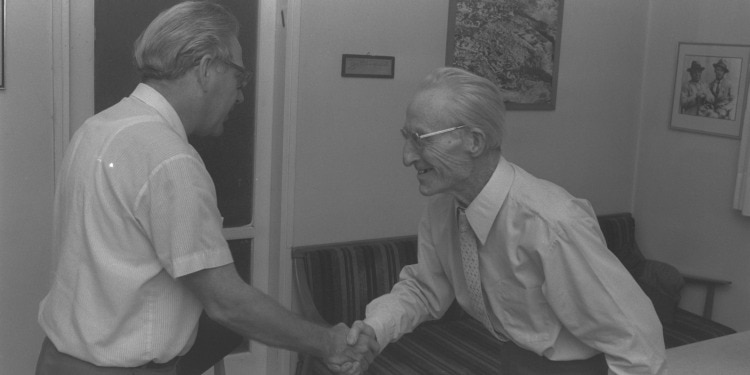A Poet of the Jewish People
Stand for Israel | September 19, 2022

An acclaimed Zionist, poet, and journalist who wrote in both Hebrew and Yiddish, Uri Zvi Greenberg also defied anti-Semitic authorities in pre-state Israel and served in the Knesset for the burgeoning Jewish state.
Uri Zvi Greenberg was born into a Jewish family in Galicia in the Austro-Hungarian Empire. After fighting in World War I, Greenberg returned home to witness the pogroms against Jews that occurred in 1918. He and his family miraculously survived the anti-Semitic violence, and he moved first to Warsaw and then Berlin.
In 1923, Greenberg made aliyah (immigrated) to then-British-mandate Palestine. He had returned to Poland before World War II, but was able to escape in 1939 when the Nazis invaded.
Greenberg first published in Yiddish in 1912, when only 16. His first book was published while he was away fighting during WWI. Before making aliyah, he was part of Warsaw’s thriving Jewish cultural scene.
After arriving in the Holy Land, Greenberg wrote for Davar, one of the main Zionist newspapers. In both his prose and as a poet, he warned the Jews of the Diaspora. After the Holocaust, he was saddened that many of his warnings had come true. His writing often incorporated the Bible, as well as traditional Jewish values and prayers.
Besides his writing, Greenberg was also an avid political activist in Israel. He advocated Zionism, sounded the shofar in prayer at the Western Wall, despite the British prohibiting it, and tore down Nazi flags hung in Jerusalem and Tel Aviv.
Following Israel’s independence, Greenberg was elected to the first Knesset. In 1947, 1954, and 1977, he was awarded the Bialik Prize for literature. In 1957, the beloved poet was also awarded the Israel Prize.
Here is an excerpt from Greenberg’s ode to the Jewish people, a poem titled “Nation, How Great You Are!”:
Even in captivity mounting to millions!
Your sons, broad of shoulder and strong in spirit.
Arms of iron, thighs of steel;
Sons to work the soil and make homes,
Sons to build houses and factories,
Bridges and tunnels, harbours and highways;
Sons marching to battle against the foe,
Striking the fear of their ancient race into his heart;
Sons to run trains, steer ships, pilot planes,
To sing Hebrew chanteys
In all the seaports of the world,
Wherever they put in with their cargoes;
Shades of sunset in their faces,
And the might of the sea in their eyes.
Nation, your abundant daughters, lovely and sound,
Daughters to work in village and town;
Blessed, themselves, to branch forth like trees,
Giving birth to a new generation
Healthy and fair and tanned by the sun.
And from them-prophets and scholars,
Men of action and daring,
Rulers to take command.
